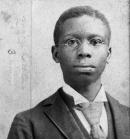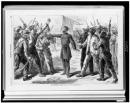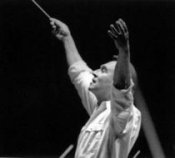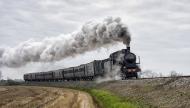From Chicago to New York
one of the fastest trains
the crack train from New York
from New York to Los Angeles
different trains every time
from Chicago to New York
in 1939
1939
1940
1941
1941 I guess it must’ve been
1940
on my birthday
The Germans walked in
walked into Holland
Germans invaded Hungary
I was in second grade
I had a teacher
a very tall man, his hair was completely plastered smooth
He said: ‘Black Crows invaded our country many years ago’
and he pointed right at me
No more school
You must go away
and she said ‘Quick, go!’
and he said: ‘Don’t breathe!’
into those cattle wagons
for four days and four nights
and then we went through these strange - sounding names
Polish names
Lots of cattle wagons there
They were loaded with people
They shaved us
They tattooed a number on our arm
Flames going up to the sky - it was smoking
And the war was over
Are you sure?
The war is over
going to America
to Los Angeles
to New York
from New York to Los Angeles”
one of the fastest trains
but today, they’re all gone
There was one girl, who had a beautiful voice
and they loved to listen to the singing, the Germans
and when she stopped singing they said, ‘More, more’ and they applauded
America-Before the War (movement 1)
From Chicago to New York
one of the fastest trains
the crack train from New York
from New York to Los Angeles
different trains every time
from Chicago to New York
in 1939
1939
1940
1941
1941 I guess it must’ve been
Europe-During the War (movement 2)
1940
on my birthday
The Germans walked in
walked into Holland
Germans invaded Hungary
I was in second grade
I had a teacher
a very tall man, his hair was completely plastered smooth
He said: ‘Black Crows invaded our country many years ago’
and he pointed right at me
No more school
You must go away
and she said ‘Quick, go!’
and he said: ‘Don’t breathe!’
into those cattle wagons
for four days and four nights
and then we went through these strange - sounding names
Polish names
Lots of cattle wagons there
They were loaded with people
They shaved us
They tattooed a number on our arm
Flames going up to the sky - it was smoking
After the War (movement 3)
And the war was over
Are you sure?
The war is over
going to America
to Los Angeles
to New York
from New York to Los Angeles”
one of the fastest trains
but today, they’re all gone
There was one girl, who had a beautiful voice
and they loved to listen to the singing, the Germans
and when she stopped singing they said, ‘More, more’ and they applauded
envoyé par Bartleby - 17/11/2011 - 14:59
Farò ascoltare questa composizione per parlare del Giorno della Memoria in classe. Grazie
Elisabetta - 22/1/2022 - 09:28
Non era un autista di autobus, semmai un cuccettista dei treni della notte fra le due coste degli USA.
Stefano Maggi - 19/2/2024 - 16:53
×
![]()









Tre movimenti per quartetto d’archi e nastro magnetico.
(copertina del disco in cui il brano è interpretato dal The Smith Quartet.)
Reich, nato nel 1936 a New York da padre di fede ebraica, quando era bambino, e mentre in Europa divampavano guerre ed Olocausto, fu sballottato per diverso tempo tra New York e California a causa del divorzio dei suoi genitori. Molti anni dopo, quando già era acclamato come uno dei padri della musica minimale, a Reich capitò di riflettere sul fatto che i viaggi in treno coast to coast che gli erano toccati nell’infanzia, per quanto frequenti e faticosi (un vero incubo nella sua memoria), erano nulla al confronto delle tradotte verso i campi di concentramento e sterminio su cui furono stipati tanti bambini come lui, ebrei d’Europa, durante la seconda guerra mondiale: “Different Trains”.
Il testo è costituito da interviste che Reich fece negli USA e in Europa a persone che vissero gli anni intorno alla guerra. Nel primo movimento le voci sono quelle di Virginia, la tata di Reich quando era piccolo, e di Lawrence Davis, un autista di autobus, che ricordano come erano i viaggi in treno nell’America prima della guerra; nel secondo movimento, Paul, Rachel e Rachella, tre ebrei sopravvissuti allo Sterminio in Europa, raccontano dell’occupazione nazista, dell’antisemitismo subìto a scuola (i “corvi neri”, ossia gli ebrei) e della deportazione nei campi; nel terzo movimento torna il fischio rassicurante dei treni sulle rotaie d’America, ma nella memoria dei sopravvissuti trasferitisi oltre oceano resta il dolore e l’insopprimibile ricordo del Male subìto, di una bambina ebrea che con la sua splendida voce incantava i soldati nazisti e che – come tanti - non tornò mai più dall’inferno in cui fu precipitata…